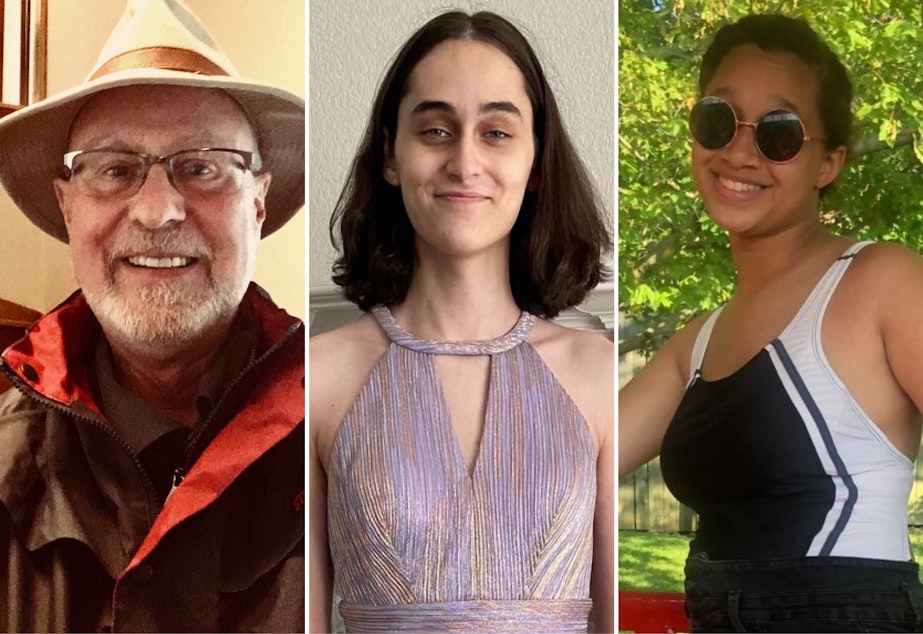Is college the best path for everybody?: Today So Far

- What is the best college advice to give young students? Is college even the best path for everybody? A few experts weigh in.
- Also, a joint KUOW-Seattle Times report reveals that Seattle police are not investigating many sexual assault cases.
This post originally appeared in KUOW's Today So Far newsletter for June 1, 2022.
I took the scenic route through college — working, classes, becoming a housekeeper at a Bavarian hotel, more classes, working again, and so on. When I finally decided to buckle down and get that degree, I visited my university's career center for some guidance. After asking me about my goals, a career counselor put down their pen and notes, looked me in the eyes and said quite casually: "Look, just get a degree in whatever you think is fun. It doesn't matter."
I had just made a lot of life changes to return to college, so I was a little frustrated by this answer. But they continued.
"Having a degree is great. Employers want to see that you have it. But what they really want to see is your experience."
They also want to see your connections, attitude, etc. Don't get me wrong. If you're going to be a doctor or an engineer, you better have a relevant college degree. But in that moment, I could tell this career counselor had seen a lot of students like me who weren't going to be doctors, but expected college to deliver some bright future. The answer for us was generally the same: use college for all the opportunities outside of class.
That advice ended up being more valuable than I initially thought. I went to classes, but my main focus was on relevant clubs that provided experience, or mentors who could offer advice and networking. It wasn't the classic perspective on higher education that I grew up with. But it worked.
Sponsored
That memory popped up as I read the latest Soundside story on the current decline in college enrolment, and rise in tuition. Marina Parr with Washington’s Workforce Training and Education Coordinating Board tells KUOW that students have a range of options today, from trade schools to short-term, career-focused training. She argues that young students should be thinking about career paths a lot sooner. In hindsight, that certainly fits with my experience. But not everyone agrees with that perspective.
Michael Horn, co-host of the podcasts "Future U" and "Class Disrupted," says that a four-year degree does ultimately add up to better opportunities, however, students should have a good answer to why they're going to college. UW Professor Sarah Stroup heads up the university's Humanities First program. She argues that humanities degrees are not direct paths to a career. Rather, they present an array of options, from journalism to owning a bar.
It seems that their are many paths. Perhaps it's more about giving young students a better map to chart a course. Check out Soundside's full segment on this topic here.
I brought up this topic in a recent newsletter. It prompted a few TSF readers to write in with their experiences and thoughts on college vs trade school vs other options. This issue comes up among Hazel's elementary school students. Hazel is a local teacher with a master's degree in education. Some want to be athletes and wonder if college is necessary for that path. One student is going straight to work in their family's restaurant. Another wants to be an author.
"I think that not only should we make the varied options like trade school clear to kids, we should normalize taking college slowly or starting and coming back later, or working for a while first, or anything else that leads to graduating when you're older than 22," Hazel wrote.
Sponsored
Another reader, Steve, questions whether this is an apples-to-apples issue. He recommends doing a side-by-side lifetime comparison between trades and degrees.
"Are the long-term benefits of careers in the trades the same, better, or less than for those who graduate with college degrees and work elsewhere?" Steve wrote.
Do you have any more thoughts?
One more story for today. KUOW's Ashley Hiruko has teamed up with The Seattle Times to uncover how the Seattle Police Department has stopped investigating sexual assault cases this year. According to an internal memo, SPD's sexual assault and child abuse unit doesn't have enough staff to handle the caseload. That means cases are not being assigned. SPD has suffered a staffing decline over the past few years. And that is affecting work in units like this one.
Assistant Chief Deanna Nollette counters this narrative, saying that while the workload is heavy, the cases are being "triaged based on a number of factors that we would traditionally use to triage those cases."
Sponsored
Read the full story here.
AS SEEN ON KUOW

From left: Bill Thieleman, Madi Goldstein, and Eridon Stewart. Lyn Strober-Cohen discusses the experience of LGBTQ community members across different generations in a recent episode of KUOW's RadioActive. (Courtesy of Bill Thieleman, Madi Goldstein, and Eridon Stewart)
DID YOU KNOW?
Sponsored
Washington state is the best state for Millennials, according to a recent assessment by WalletHub, which hired a few smarty pants to calculate a number of factors to rank the states. Such factors include quality of life, affordability, civic engagement, and economic health among other attributes. All added up, Washington ranks at the top of the list.
Specifically, Washington comes in fourth for Millennial earnings and for having a high population of other Millennials around. And when it comes to housing costs and homeownership ... just kidding. Washington didn't rank anywhere near the top in those categories (no big surprise there). But we did come in ninth place when it comes to the number of Millennials living with their parents.
At the bottom of the list is Mississippi, the worst state for Millennials.
ALSO ON OUR MINDS

Sponsored
Treasury Secretary Janet Yellen says she was wrong about the risks of inflation
Treasury Secretary Janet Yellen said she was wrong a year ago when she said she anticipated inflation would be "a small risk," "manageable" and "not a problem." In an interview, she admitted she had misjudged the threat inflation posed.

